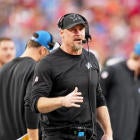This is Part 2 of our Agent's Take series covering sensible target contracts for this year's top available players. You can get a primer on the series and read about three key quarterbacks here. Part 3 covers six key defensive players who are free agents or were tagged before the deadline.
The exclusive negotiating rights teams have had with their impending free agents ends on March 12. NFL teams are allowed to negotiate with the agents of prospective unrestricted free agents during a two-day period ending at 3:59:59 p.m. ET on March 14. Players can't sign deals with new clubs until the 2018 league year and free agency officially begin at 4 p.m. ET. A player's ability to re-sign with his current club is allowed during the period.
Remember: The target or asking prices for these players may be on the high side and aren't necessarily what their actual deals will be.
RB Le'Veon Bell (franchise tag)
- Target contract package: five years, $71.25 million
- Overall guarantees: $19 million
- Fully guaranteed at signing: $19 million
- First three years: $45 million
The Steelers designated Bell as an exclusive franchise player for a second straight season at $14.544 million, which is a CBA mandated 20 percent increase over his $12.12 million 2017 salary, after an agreement on a new contract couldn't be reached by the February 20 artificial deadline set by the parties. February 20 was the first day teams could use the franchise or transition designation on players. The exclusive franchise tag prevents Bell from soliciting offer sheets from other teams.
Bell rejected a contract offer in 2017 the NFLPA reportedly found appropriate as the mid-July deadline for franchise players to sign multi-year deals approached. Multiple reports put the offer in the $60 million neighborhood for five years. The reports differed on other details of the offer. There was $39 million to $42 million over the first three years. Pittsburgh's offer was substantially more than the current $8.25 million per year benchmark held by the Falcons' Devonta Freeman in what has been a declining running back market. Bell was looking to build upon the contract Adrian Peterson had been playing under since 2011 averaging approximately $14 million per year before the Vikings released him in last offseason.
Instead, Bell waited until a few days before the regular season opener to sign his franchise tender. Bell has indicated he will to the same thing again absent a long term deal.
Bell solidifying his place as the game's best dual threat running back in 2017 is only going make him more resolute in his contract demands, if not increase them. He was third in the NFL with 1,291 rushing yards despite a sluggish start to the season due to him waiting so long to get under contract and sitting out the season finale for precautionary measures with the playoffs looming. His 1,946 yards from scrimmage (combined rushing and receiving yards) were second most in the league. He also led running backs with 85 receptions.
The willingness to pay Bell $26.664 million over two years with franchise tags suggests that the Steelers should be comfortable paying him in excess of $13 million per year on a long term deal. Pittsburgh's vanilla contract structure may be the biggest impediment to reaching an agreement. With the exception of Roethlisberger, the only true guaranteed money in Steelers deals is a signing bonus. Roethlisberger's guarantees are for injury only. The bigger deals contain a third or fifth day of the league year roster bonus in the second and third years. The roster bonuses are supposed to be substitutes for additional contract guarantees. Wide receiver Antonio Brown only has $19 million guaranteed in the $17 million per year extension he signed last offseason.
WR Jarvis Landry (franchise tag)
- Target contract package: five years, $75 million
- Overall guarantees: $48 million
- Fully guaranteed at signing: $35 million
- First three years: $48 million
Landry has already signed the $15.982 million franchise tag the Dolphins placed on him. The Dolphins have given Landry's agent permission to seek a trade. The Bears and Ravens have reportedly expressed some interest, but nothing is imminent.
Trading Landry could prove to be difficult. Nobody was willing to pay Miami's steep price for what could have amounted to the league's most productive slot wide receiver only playing just a handful of games in return when the Dolphins were reportedly open to moving Landry before last season's October 31 trading deadline. A similar dynamic exists this time because the acquiring team presumably would be giving up substantial draft capital and/or players while also paying Landry like an elite wide receiver. The most recent data point in the wide receiver market is the four-year, $58.5 million extension the Packers gave Davante Adams at the end of the 2017 regular season.
Landry has the most catches during the first four seasons of an NFL career with 400. He led the NFL in 2017 with 112 receptions but didn't crack the 1,000-yard mark while averaging a meager 8.8 yards per catch. Top wide receiver pay is typically reserved for those that excel on the outside or can take the top off opposing defenses, which are things Landry hasn't done.
WR Allen Robinson
- Target contract package: one year, $10 million (worth up to $15 million through incentives)
- Overall guarantees: $9 million
- Fully guaranteed at signing: $9 million
The Jaguars decided against putting a $15.982 million franchise tag on Robinson, who is still rehabbing the left ACL he tore in the 2017 season opener. If he had bounced back from a subpar 2016 season that can be attributed to quarterback Blake Bortles's struggles, Robinson may have already signed a new contract with Jacksonville comparable to the five-year, $81 million extension containing $49 million in guarantees DeAndre Hopkins got from the Texans at the end of last preseason.
Letting Robinson test free agency is a calculated risk. It's conceivable that some team with a need at wide receiver and an abundance of cap room -- like the 49ers, Bears or Colts -- will make Robinson a long-term offer reflecting his capabilities when healthy. In 2015, Robinson became the first Jaguars player to top 1,000 receiving yards (with 1,400) since Jimmy Smith in 2005. He also led the NFL with 31 catches of 20 or more yards.
The more likely scenario is Robinson betting on himself with a one-year "prove it" deal. That's what Alshon Jeffery did last year because of 2016 season in which he served a four-game suspension for violating the NFL's performance enhancing drugs policy and an injury plagued 2015. Jeffery opted for a one-year, $9.5 million contract (worth up to $14 million through incentives) from the Eagles instead of signing a below-market long-term deal. The Eagles gave him a four-year, $52 million extension with slightly more than $27.25 million in guarantees late last season.
TE Jimmy Graham
- Target contract package: four years, $34 million
- Overall guarantees: $17.5 million
- Fully guaranteed at signing: $17.5 million
Graham regressed statistically in 2017 after setting franchise records for a tight end with 65 receptions for 923 yards in a comeback 2016 season. That followed a 2015, his first year in Seattle, in which he tore the patellar tendon in his right knee. Although Graham excelled as a red-zone threat in 2017 catching in 10 touchdown passes, he is unlikely to get the same money at 31 years old after a major knee injury as he did at 27 when the Saints made him the NFL's first and only $10 million per year tight end.
The free-agent tight end market was tough to figure out last year. Martellus Bennett was clearly the best available at the position but didn't land the richest free agent contract. Bennett's three-year, $21 million deal with the Packers only had $6.3 million guaranteed. Jermaine Gresham, who caught 37 passes for 391 yards in 2016, returned to the Cardinals on a four-year, $28 million deal with $16.5 million in guarantees. Dion Sims fundamentally changed the market for tight ends known more for blocking than pass catching. He got $18 million over three years from the Bears with $10 million in guarantees.
There's been speculation that a reunion with the Saints is a possibility. Coby Fleener has been a disappointment since signing a five-year, $36 million contract, which has $18 million of guarantees, with New Orleans in 2016.
OG Andrew Norwell
- Target contract package: five years, $65 million
- Overall guarantees: $35 million
- Fully guaranteed at signing: $28 million
- First three years: $41 million
Norwell, who earned first team All-Pro honors in 2017, is going to be the next big beneficiary of the explosion in offensive guard salaries over the last couple of years, since the Panthers didn't franchise him for $14.077 million.
An unrestricted free agent has set the guard market in each of the last two years. The current benchmark is the five-year, $60 million deal containing $31.5 million in guarantees Kevin Zeitler received from the Browns last March.
The Giants are widely considered the front runner to sign Norwell because new general manager Dave Gettleman was in charge of the Panthers when Norwell was signed as undrafted free agent in 2014.
OT Nate Solder
- Target contract package: five years, $72.5 million
- Overall guarantees: $40 million
- Fully guaranteed at signing: $31.5 million
- First three years: $46.5 million
Solder is hitting the open market because his expiring two-year, $20.062 million extension (with a maximum value of $21.562 million) signed at the start of the 2015 regular season has a clause prohibiting the Patriots from designating him as a franchise or transition player. He rebounded from a slow start to the season, and he was part of the reason why Patriots quarterback Tom Brady was sacked almost as many times during New England's first five games as in the 12 he played during the 2016 regular season.
Solder is in an enviable position, provided he doesn't give the Patriots some sort of hometown discount to stay put. Slightly above average and mediocre left tackles have become valuable commodities in free agency. The Chargers made Russell Okung the NFL's highest-paid offensive lineman (by average yearly salary) in 2017 with a four-year, $53 million deal that has $25 million fully guaranteed in free agency even though he is never going to confused with future Hall of Famer Joe Thomas as a pass protector. Matt Kalil's five-year, $55.5 million contract with the Panthers containing $25 million in guarantees is prime example of mediocrity getting rewarded.





















